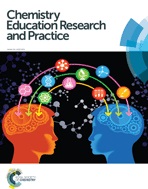Untangling a complex relationship: teaching beliefs and instructional practices of assistant chemistry faculty at research-intensive institutions†
Abstract
In this era of instructional transformation of Science, Technology, Engineering, and Mathematics (STEM) courses at the postsecondary level in the United States, the focus has been on educating science faculty about evidence-based instructional practices, i.e. practices that have been empirically proven to enhance student learning outcomes. The literature on professional development at the secondary level has demonstrated a tight interconnectedness between ones’ beliefs about teaching and learning and one's instructional practices and the need to attend to faculty's beliefs when engaging them in instructional change processes. Although discipline-based education researchers have made great strides in characterizing instructional practices of STEM faculty, much less attention has been given to understanding the beliefs of STEM about teaching and learning. Knowledge of instructors’ thinking can inform faculty professional development initiatives that encourage faculty to reflect on the beliefs that drive their classroom practices. Therefore, this study characterized the interplay between beliefs and instructional practices of nineteen assistant chemistry professors. Luft and Roehrig's Teaching Beliefs Interview protocol was used to capture beliefs; classroom observations and course artifacts were collected to capture practices. Clear trends were identified between faculty's beliefs (characterized through constant-comparative analysis and cluster analysis) and practices (characterized with Blumberg's Learner-Centered Teaching Rubric). Overall, beliefs of most of the participants were somewhat aligned with their instructional practices, with the exception of one cluster of faculty who held student-centered beliefs, but received only moderate scores on the Learner-Centered Teaching Rubric.


 Please wait while we load your content...
Please wait while we load your content...
